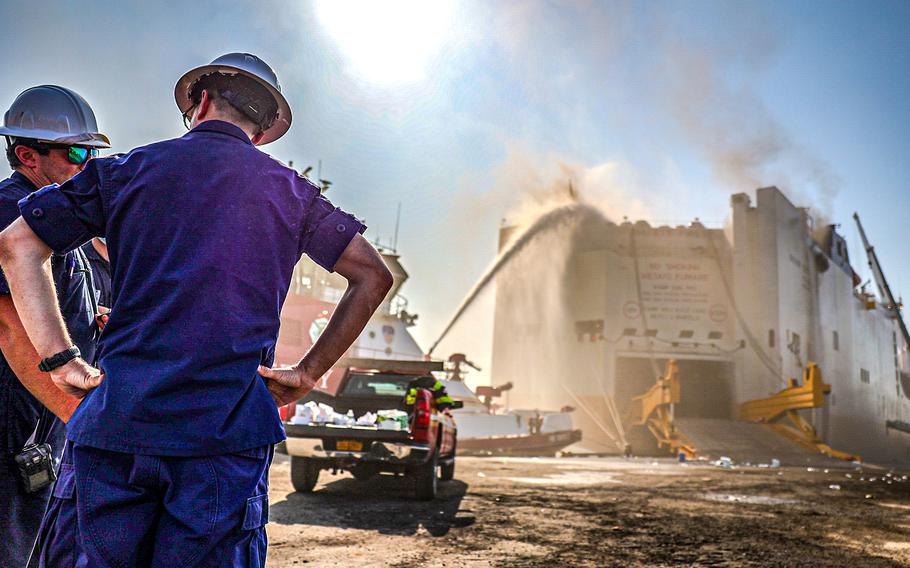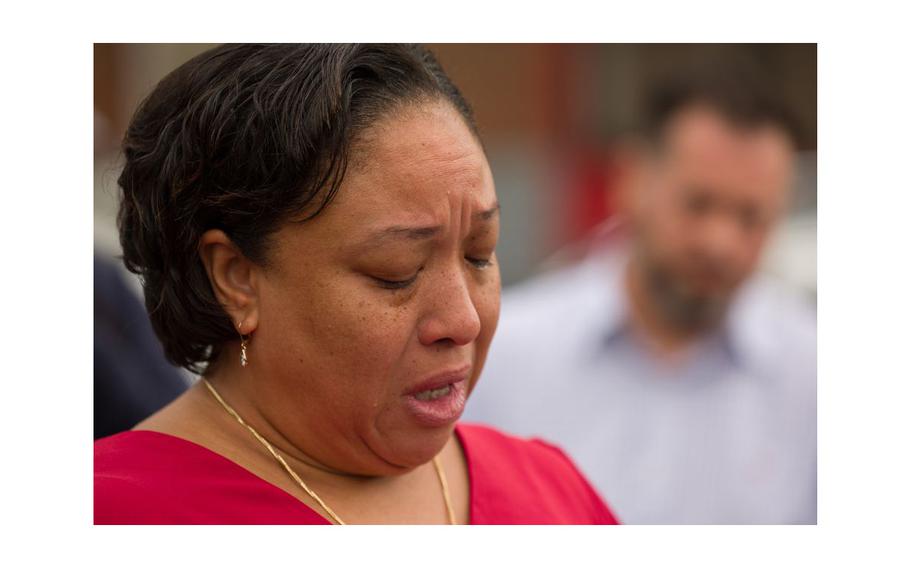
Coast Guard members discuss response operations to a fire on the motor vessel Grande Costa D’Avorio in Port Newark, New Jersey, on July 6, 2023. Marine fire fighting specialists are actively conducting fire suppression both from the pier and on the water. (Dan Henry/U.S. Coast Guard)
(Tribune News Service) — Before fire swept through the Grande Costa d’Avorio in July — killing two Newark firefighters who died aboard the blazing ship — dockworkers had been loading the freighter with an old Jeep that had been experiencing serious mechanical problems all day, later erupting in flames.
And before the Newark Fire Department even arrived, the ship’s own fire brigade tried and failed “in multiple ways” to put it out.
The families of the two firefighters who died said Friday they plan to sue owners of the vessel, along with the stevedoring company that had been in charge of loading her, the marine terminal where the freighter had been berthed, as well as the city of Newark, charging negligence had been to blame for the loss of the two men.
Calling their deaths “tragic and preventable,” attorney Mark Apostolos said he was seeking justice for the families of Wayne “Bear” Brooks Jr., 49, and Augusto “Augie” Acabou, who would have turned 46 on Friday. Speaking in front of the red brick firehouse of Engine Co. 16, where Acabou had been assigned, the attorney said the city has already been service with a notice of intent regarding a planned tort claim.

Michele Brooks, widow of deceased Newark firefighter Wayne Brooks Jr., who died while battling a cargo ship fire in Port Newark this summer, speaks at a press conference in Newark on Friday Oct. 6, 2023. (Steve Hockstein for NJ Advance Media /TNS)
Michele Brooks, the wife of Wayne Brooks, spoke briefly during a noontime press conference on Ferry Street, talking of her husband’s loss.
“On July 5, 2023, our lives were changed forever,” she said, tearfully.
Wearing a gold Newark Fire Department pendant with her husband’s badge number, she said his departure left a tremendous void.
“Wayne was taken from us in a manner that was entirely preventable,” she said. “We are committed to have those responsible for the loss of two precious lives held accountable.”
Acabou’s brothers, Joao and Miguel, stood with their mother, Maria.
Miguel Acabou called his late brother a hero, who had stood as a guardian “even at the risk of his own life,” which he said was tragically taken.
Newark Mayor Ras Baraka, in a statement, said he knew the families “want and need answers and resolutions” so that they can make some kind of sense out of their loss.
“The city wants the same thing. We trust that the investigators are completing their process as quickly and expeditiously as possible while maintaining the integrity of their examination and analysis,” he said. “It’s my deep hope that this investigation will yield the information the families need for healing, and that the answers will benefit all firefighters in Newark, and everywhere.”
Apostolos, meanwhile, said he planned to fight the ship owners’ claims of a limitation of liability against the vessel and the company over what happened. In federal court filings, they claim that under maritime law, the Grande Costa d’Avorio and its cargo were valued at $15.9 million — representing the most that anyone could claim in damages, should liability be found. The attorney said he would challenge that.
Grimaldi Deep Sea, the owner of the Italian-flagged Grande Costa d’Avorio, has maintained that the fire was not its fault.
“Our hearts go out to the families of the two firefighters, a spokesman for the shipping company on Friday. “Due to the pending litigation and out of respect for the legal process, it would be inappropriate to comment further at this time.”
According to Apostolos, who has deposed members of the crew and others in expectation of a lawsuit, the fire aboard the ship was directly caused by a Jeep Wrangler being used to push a number of inoperative vehicles on board as cargo.
The lawyer said smoke had been seen coming out of the Jeep’s engine compartment hours before the fire even began. Yet he said workers loading the ship continued to use the Wrangler until it “started a fire that caused a massive inferno to take place aboard the ship’s top decks.”
American Maritime Services, the stevedoring company that was loading the vessels and Ports America, the marine terminal operator, did not respond to requests for comment.
Beyond the problems with the Jeep, Apostolos said the ship’s own fire brigades, manned by crew members, failed “in multiple different ways to put this fire out” before firefighters even came on board.
“They first failed to put the fire out locally, that is with fire extinguishers and hoses, and then they failed to properly follow the procedures that they had in place upon the ship to deploy the CO2 fire suppression system,” the lawyer said.
The U.S. Coast Guard and the National Transportation Safety Board along with state, local and other federal agencies are now investigating the cause of the fire, which took six days to extinguish.
©2023 Advance Local Media LLC.
Visit nj.com
Distributed by Tribune Content Agency, LLC.